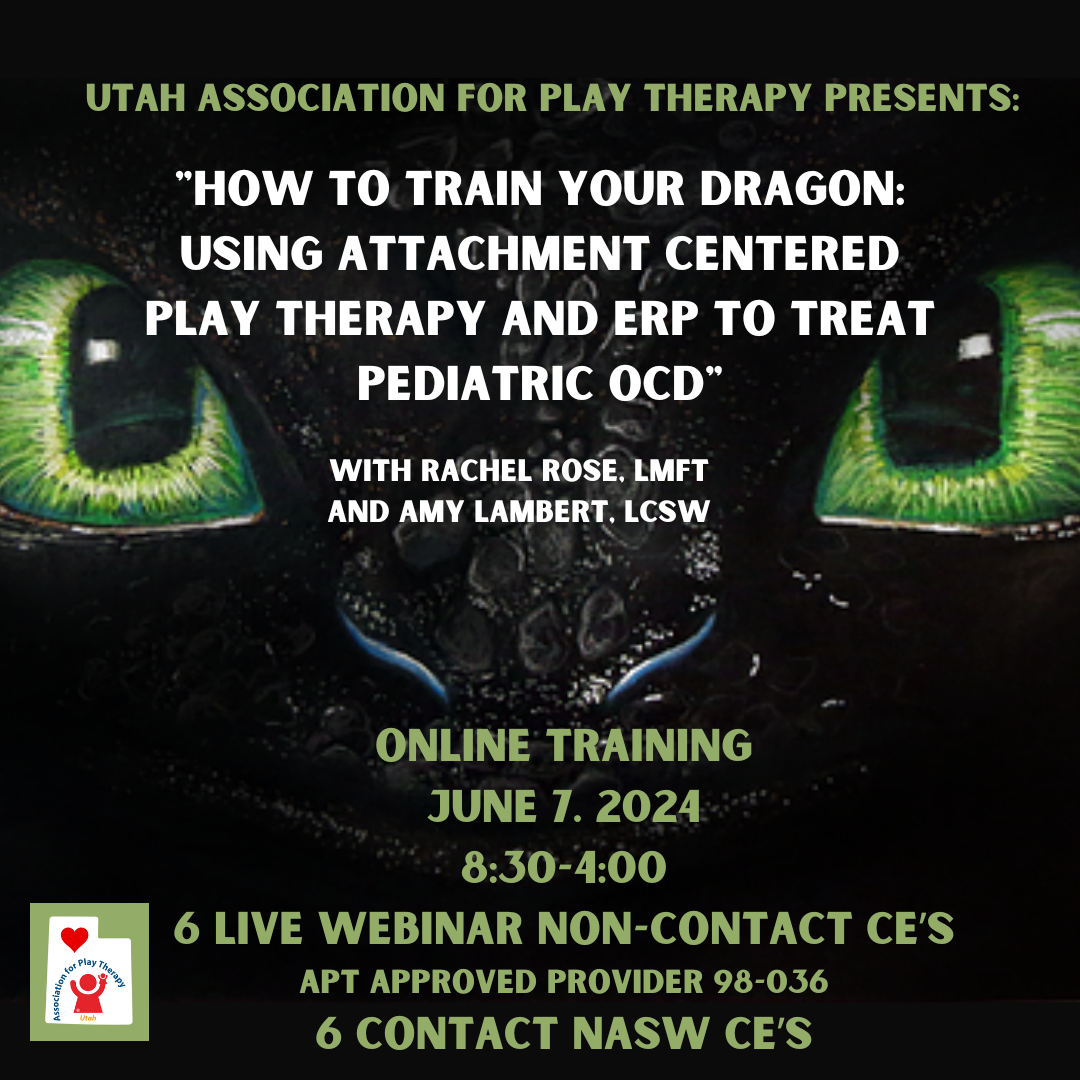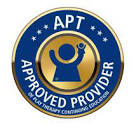
Online Training – “How to Train Your Dragon: Using Attachment Centered Play Therapy and ERP to Treat Pediatric OCD”
June 7 @ 8:30 am - 4:00 pm

“How to Train Your Dragon: Using Attachment Centered Play Therapy and ERP to Treat Pediatric OCD”
With Amy Lambert, LCSW and Rachel Rose, LMFT
Online training!!!
June 7, 2024
8:30 am – 4:00 pm (mst)
This training will offer 6 Live Webinar Non-Contact CE’s from APT
- Participant may choose the following to apply this training toward requirements for the RPT (TM) credential: Play Therapy Skills and Methods, Play Therapy Special Topics, or Applicant’s Choice
This training will offer 6 Contact NASW CE’s
Registration Fee:
UAPT Member: $100.00 (APT membership is $95.00 a year. If you are not already a member of APT/UAPT and want to receive awesome discounts – go to https://www.a4pt.org/page/Membership)
Non-UAPT Member: $150.00
Students: $50.00
Overview:
- This introductory workshop equips participants with essential skills to recognize, diagnose, and treat Pediatric Obsessive-Compulsive Disorder (OCD) using evidence-based methods.
- Participants will learn the DSM-5 diagnostic criteria for OCD and evidence-based assessments to identify the disorder in children and teens.
- Through a blend of theory and practice, participants will explore Attachment-Centered Play Therapy, integrating Attachment Theory and Cognitive Behavioral Theory to develop effective interventions for individuals and families impacted by OCD. The workshop emphasizes the importance of involving the entire family in treatment to address attachment wounds exacerbated by OCD symptoms.
- Special attention will be given to supporting neurodivergent children and teens with OCD, offering tailored strategies to meet their unique needs. Participants will leave with a comprehensive toolbox of play therapy interventions to enhance self-esteem, strengthen relationships, and empower clients to regain control over their lives.
- Using a combination of lecture and experiential activities, participants will gain practical skills and confidence to make a meaningful impact in the lives of children, teens, and families affected by OCD. This workshop is suitable for practitioners seeking introductory training in ERP and Attachment-Centered Play Therapy, with a focus on addressing pediatric OCD within the family context.
Outline of the training:
- Introduction (30 minutes)
- Welcome and Introductions
- Overview of Workshop Objectives and Agenda
- Importance of Integrating ERP and Attachment-Centered Play Therapy for Pediatric OCD with Parental Involvement
- Understanding Pediatric OCD (60 minutes)
- Definition and Diagnostic Criteria of Pediatric OCD
- Prevalence and Common Symptoms
- Impact of Children, Teens, and Families
- Cultural Considerations on Pediatric OCD Diagnosis and Treatment
- Introduction to ERP (90 minutes)
- Principles and Goals of Exposure and Response Prevention (ERP)
- Evidence-Based Techniques for ERP in Pediatric OCD
- Case Studies and Examples of ERP Implementation
- Overview of Attachment Theory and its Application in Play Therapy
- Introduction to Attachment-Centered Play Therapy Techniques
- Role of Play in Healing Attachment Wounds in Pediatric OCD
- Integrating ERP with Attachment-Centered Play Therapy (90 minutes)
- Understanding the Synergy Between ERP and Play Therapy
- Practical Strategies for Integrating ERP Techniques with Play Therapy Interventions
- Hands-On Activities and Role-Playing Exercises
- Parental Involvement in Pediatric OCD Treatment (60 minutes)
- Importance of Active Parental Involvement in Therapy
- Strategies for Engaging Parents in Treatment Sessions
- Supporting Parents in Implementing ERP Techniques at Home
- Addressing Diversity and Cultural Considerations (30 minutes)
- Recognizing and Respecting Diversity in Pediatric OCD Treatment
- Tailoring Treatment Approaches to Accommodate Diverse Cultural, Linguistic, and Socio-Economic Backgrounds
- Case Studies and Group Discussion (60 minutes)
- Analyzing Case Studies to Apply Workshop Concepts
- Group Discussion on Challenges and Solutions in Pediatric OCD Treatment
- Sharing Best Practices and Success Stories
- Conclusion and Wrap-Up (30 minutes)
- Summary of Key Learnings
- Action Planning: Applying Workshop Concepts in Participants’ Clinical Practice
- Closing Remarks and Evaluation
- Distribution of Workshop Materials and Resources
Hourly Breakdown:
- 8:30 am – Training begins – you will receive a link before the training
- 10:30-10:45 am- Break
- 12:00-1:00 pm – Lunch
- 3:00-3:15 pm- Break
- 4:00 pm – End
Objectives:
- Assess and diagnose OCD symptoms correctly while ruling out developmentally appropriate behavior in
play therapy - Explain the importance of ERP in treating pediatric OCD and 3 common play themes that can be
incorporated with ERP - Identify their own biases when it comes to using ERP to treat pediatric OCD
- Apply a systemic treatment approach involving parents utilizing attachment centered play therapy
- Practice 3 specific play therapy interventions to treat OCD
- Apply the integration of ERP and attachment centered play therapy to a presented case study
About the Presenters:

Rachel Rose, LMFT, is experienced in supporting adolescents, adults, and family systems in cultivating emotional
resilience and promoting flexible thinking. With a focus on anxiety disorders and obsessive-compulsive and related
disorders, Rachel employs evidence-based modalities such as Exposure and Response Prevention (ERP), Cognitive
Behavioral Therapy (CBT), Dialectical Behavior Therapy (DBT), and Play Therapy. She places a particular emphasis
on Attachment Centered Play Therapy to deliver comprehensive and tailored treatment to her clients. Having
completed almost 110 hours of play therapy training, Rachel is dedicated to advancing her expertise in providing
effective and compassionate care.

Amy Lambert, LCSW specializes in working with children and their families who suffer with
obsessive-compulsive, and anxiety-related disorders using an integration of Cognitive Behavioral Therapy,
Attachment Theory, and Play Therapy. Amy is currently working towards certification as a Registered Play
Therapist under supervision from several RPT-S’s. Amy has worked with children and their families in many
different capacities for 10+ years and as a LCSW for almost 5. Amy believes children have the power within
themselves to tackle their biggest fears, get unstuck, and gain freedom to engage with their passions in life.

contact utahplaytherapy@gmail.com for more info
UAPT Cancellation Policy
Registration cancellations must be submitted to UAPT in writing. The Conference fees, minus a $75 administrative charge, will be refunded only if the request is postmarked, or emailed to utahplaytherapy@gmail.com, 30 days prior to the conference or workshop. Registration refunds will not be made within 30 days prior to the conference or workshop. No refunds will be given to parties who register but do not attend. Registrations may be transferred to another person without penalty only if original registrant notifies UAPT.
UAPT reserves the right to cancel this conference in the event of unforeseen circumstances. If such occurs, UAPT will attempt to notify registrants at least 10 calendar days prior to the conference and refund all registration, workshop, continuing education fees.
